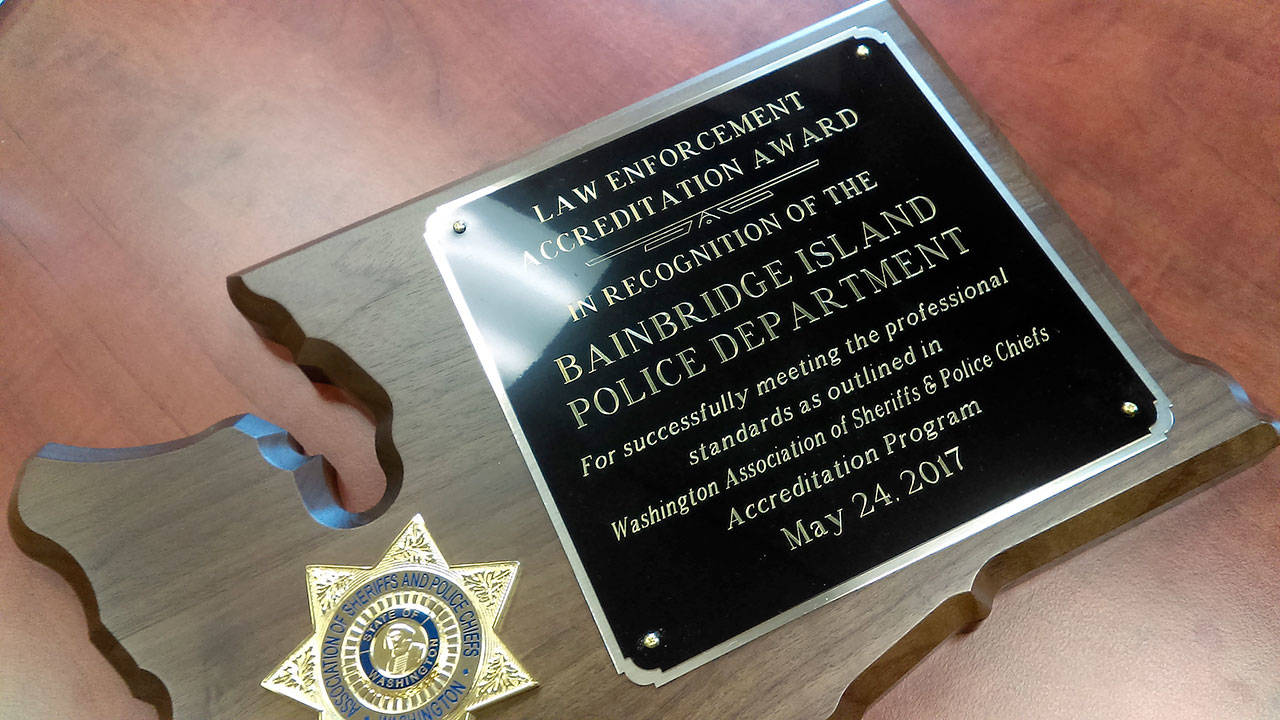The Bainbridge Island Police Department was recently awarded accredited status by the Washington Association of Sheriffs and Police Chiefs, recognizing its adherence to exacting standards in a variety of strategic and procedural areas.
The major milestone was passed following a strenuous, nearly three year long evaluation process.
Most police agencies in Washington haven’t earned the distinction, officials noted.
Only about 25 percent of the approximately 260 police departments in the state are so accredited, and Bainbridge is only the second ever in Kitsap County, said Bainbridge Police Chief Matthew Hamner.
“To me, this is huge,” Hamner said.
“We want to do things in the best manner and give the best service. That’s what we are: public servants. We want to make sure that if we’re serving, we’re doing it in the best manner possible. And what accreditation allow us to do is to say, ‘Yes, we are.’”
Hammer received a plaque from the accrediting officials on behalf of the department at a gathering in Spokane on May 24.
“As I walked down from the podium, chiefs were standing up and congratulating me,” Hamner said.
“One of them said, ‘I tried to get our department accredited. We failed. We’re trying again.’ So this is not something that you just say, ‘Ah, this is an easy thing to do. You check a few boxes and you make it.’ It’s a lot of work — and it should be.”
Best of the best
First begun in 1976, the current WASP accreditation program was created in 2007 and is overseen by the Professional Services Committee and Accreditation Commission, which is responsible for reviewing applicant departments and making recommendations to the association’s board of directors.
Bainbridge’s accreditation process was spearheaded by Deputy Chief Jeffrey Horn, who oversaw every aspect of the agency’s evaluation, numerous inspections and audits, and ultimate compliance, with the thorough and demanding state standards.
“He followed through,” Hamner said of Horn. “I assigned him, but he did it. And, boy, did he do it well.
“Kudos to him.”
Successful completion of the stringent process, Hamner said, places the Bainbridge department among the best law enforcement organizations in the state.
“I didn’t realize that once you get into this group of accreditation, it’s kind of an elite group,” Hamner said. “People look up to you because they realize the work it takes.”
According to WASP, the benefits of successful accreditation — and completion of the arduous assessments — for a participating police department include increasing public confidence in that agency, increased credibility, a systemized agency self-assessment, intensified administrative and operational effectiveness, potentially reduced liability insurance costs and multiple other benefits.
Trust, but verify
Hamner said the outside verification and acknowledgment is very gratifying for himself and the police staff, and should also act as a point of pride for the community at large.
“It’s just one more check from somebody else who has no skin in the game to say, ‘You didn’t do it right.’” he said.
“And they don’t care if they tell us that. I answer to them. They get tell me whether we’re accredited, and it’s not like they get anything out of it. It’s actually incumbent upon them, I think, to ensure that everyone is meeting those standards. Otherwise, you dilute the prestige of accreditation.”
Hamner credits, in addition to Horn, the hard work of all the officers, civilian assistants, department staff, the city manager, city council and the citizens of Bainbridge for the achievement.
“It’s a group effort,” he said. “[I] didn’t do it.
“It’s a whole department thing,” he added. “I want to make sure the public knows they have a good department.”
To maintain accreditation, awarded agencies must be reaccredited every four years, Hamner explained.
Reaccreditation is based on documented compliance on a yearly basis, to which end Hamner has arranged, with the city manager, to hire an outside expert for four hours, once a year, to examine the department’s records and policies.
“This will be verified every year,” Hamner said. “[The evaluator] kind of signs off ever year, and then at the end of the four years, we take all that we’ve done and say, ‘Look, we’ve met the standard every year for four years.’”
Ahead of schedule
The timing of the accomplishment was particularly pleasing for the chief, as the department was accredited just shy of Hamner’s four-year mark in office. He has a five-year contract with the city to serve as police chief, which has not yet been renewed.
It had taken, he said, less time than he’d at first imagined.
“I would never have guessed that it would come this soon,” the chief said. “I’m very pleased that in less than four years it’s done. This is something that I’d hoped to get done by the end of my fifth year.
“It was one of the goals that the city manager, Doug Schulze, had set for me when I arrived,” Hamner recalled. “When I got here, there definitely was a lack of confidence in some of the things the department did. And people wondered.”


